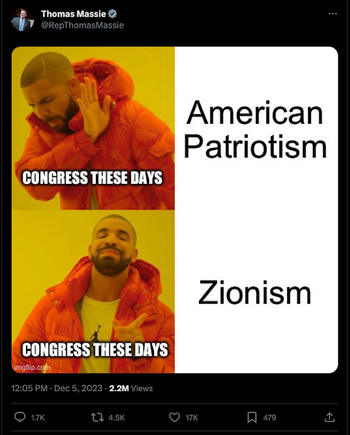The other day I was enmeshed in a Facebook thread, as one does, where a colleague was complaining about a post that equally condemned the Capital Jewish Museum shooting by a pro-Palestinian terrorist and the bombing of family homes by the IDF (
the sin of "equating", not to be confused with the sin of "one-sided"). The argument was a familiar one: the DC shooter was intentionally seeking to murder civilians (true), while the killing of Palestinian families is an "undesired", tragic byproduct of fighting an urban counterinsurgency.
My response to this argument was not to contest it, exactly. It was to ask my colleague a more basic question: what would falsify his belief? He believes that, for Israel, the deaths of Palestinian civilians are undesired. What evidence would suffice so that he would no longer believe that?
He wouldn't answer.
To be sure, he gave an answer -- but it was just more arguments for why it was still correct to think that these deaths were "undesired". Pressed again to say, okay, but what evidence would make you think otherwise, and I was met with silence.*
That was when it was clear the issue wasn't one of belief, but of dogmatic faith. The bottom line -- "Israel does not desire civilian deaths" -- was written in stone. Everything above that could and would be erased and rewritten to cohere to the bottom line. The "what would falsify" question was impossible to answer, because he knew deep down that if he committed to any non-ludicrous answer, there was a real chance his criteria would be met, and then what would he do?
This does not work. I am familiar with the arguments why the spiraling death toll in Gaza does not mean that Israel "desires" those deaths. I don't find them especially compelling anymore,** but I'm familiar with them. But one argument that has no purchase is the pure tautology: "these civilian deaths are undesired because Israel does not desire civilian deaths". That boils down to rejecting the claim because accepting it would make you feel sad. It does not work.
Nir Hasson had a powerful column the other day about how much of the Israeli media has responded to the IDF killing nine Palestinian children. The media is obsessed with every fuzzy detail or misplaced accent, every AI-generated image or overwrought recharacterization -- but all in order to kick dust around the acknowledged truth that the IDF did kill those children. It is a mirror-image of 10/7-denialism, and, as one expert observes, it is in its perverted way a form of moral self-policing:
"Denying the atrocities that your side has committed is an attempt to maintain your humanity," [Dr. Assaf David, of the Forum for Regional Thinking and the Van Leer Institute] explains. "When you say, 'There are things that my side cannot do,' it is actually a statement saying that I cannot justify these things. It's true that it's a lie and that we do do these things, but denial is trying to set a moral standard."
Denial and justification go hand-in-hand. If it was unjustified then it didn't happen, and if it happened it was justified. Flit back and forth between those positions, and one can keep the faith indefinitely.
But it doesn't work. As one side of the fulcrum grows increasingly untenable, unbearable pressure grows on the other. Here is where one starts to see either absurd exercises in denialism (most 10/7 victims were gunned down by Israel; the images of Gaza destruction are "Pallywood" concoctions) or sickening excursions into justifications (the Bibas children would have grown up to be monsters anyway; Gaza's population are tantamount to Nazi collaborators). Such maneuvers are soul-destroying, but they are inevitable when one's dogmatic faith matters more than truth.
So to my pro-Israel friends, this is my challenge to you. If you still believe that Israel is only acting in the interests of self-defense, that its overall policy and practice is one that provides Palestinian civilians with the protections they are due under international law and as human beings, that the scenes of death and destruction are not "desired" but a regrettable byproduct of the inevitabilities of urban warfare against a terrorist entity like Hamas, I won't argue with you. I'll simply ask you to ask yourself, earnestly and without flinching, what would cause you to think otherwise. Commit to something, now, so that if the evidence does come to pass you don't rationalize it away later.
And if you can't bring yourself to do that simple thing, ask yourself what that really means about the status of your faith.
* The closest he did come to an answer was by citing to civilian:combatant casualty ratios which, he said, were lower in the Gaza campaign compared to other analogous counterinsurgencies (e.g., the anti-ISIS campaign in Mosul, which he said had a ratio of 2.5:1). The Gaza ratio, he said, was closer to 1.5:1 or 1.2:1; so if the Mosul campaign wasn't one of desired civilian death, neither was Gaza. But when I pressed him as to what ratio would flip that intuition (particularly given that the 10/7 ratio was slightly worse than 2:1), he refused to commit to a number -- I suspect because he was not as confident in that 1.2 - 1.5:1 ratio as he made himself out to be and knew that if he, say, matched the 10/7 2:1 figure, he might end up being put to the proof (for my part, I've seen the 1.2 and 1.5:1 ratios cited but I've also seen much worse estimates pegging the ratio at closer to 4:1). The cynic, I suggested, might suspect that the only number he'd commit to is .5 higher than whatever ends up being the real number.
** My view is that the prevailing outlook in both the IDF and the Israeli political establishment is, at best, utter indifference to Palestinian civilian life. To the extent Palestinians civilian safety poses any impediment to a military or political objective -- which always centered around "keeping Bibi in power", and which now includes "conquering" Gaza to boot -- that interest is given virtually zero weight. As the value of children's lives approaches zero, the number of children one can justify killing to get at one Hamas operative (or keep Bibi out of prison one more day) approaches infinity.
Among the bits of evidence that buttresses that view are the spiraling death tally itself (and the individual instances of horrifying death and destruction that are virtually impossible to justify), the regular statements by top-level Israeli officials evincing criminal intentions towards the Palestinian people, the credible reports that the IDF has greatly relaxed its operational controls previously meant to assure adherence to rules of distinction and proportionality in favor of establishing effective "free-fire" zones, and the prevalence of deeply racist attitudes towards Arabs and Palestinians that polling suggests are present in Israel's military-aged populations.
There may be individual units or actors holding themselves to higher standards; there also are no doubt those holding themselves to a lower one where the death and destruction is itself a desired and terminal end. And none of this is incompatible with the belief that Hamas also is utterly indifferent to the wellbeing of the Palestinian population under its de facto rule, that it operates in civilian areas in a manner designed to further imperil the non-combatant population, and is effectively holding Gaza's population hostage in service of a crude desire to retain power. But in any case, it is wrong to say the deaths Israel inflicts on innocent Palestinians are "undesired", as that implies some level of care and concern for which there is little evidence of.

















